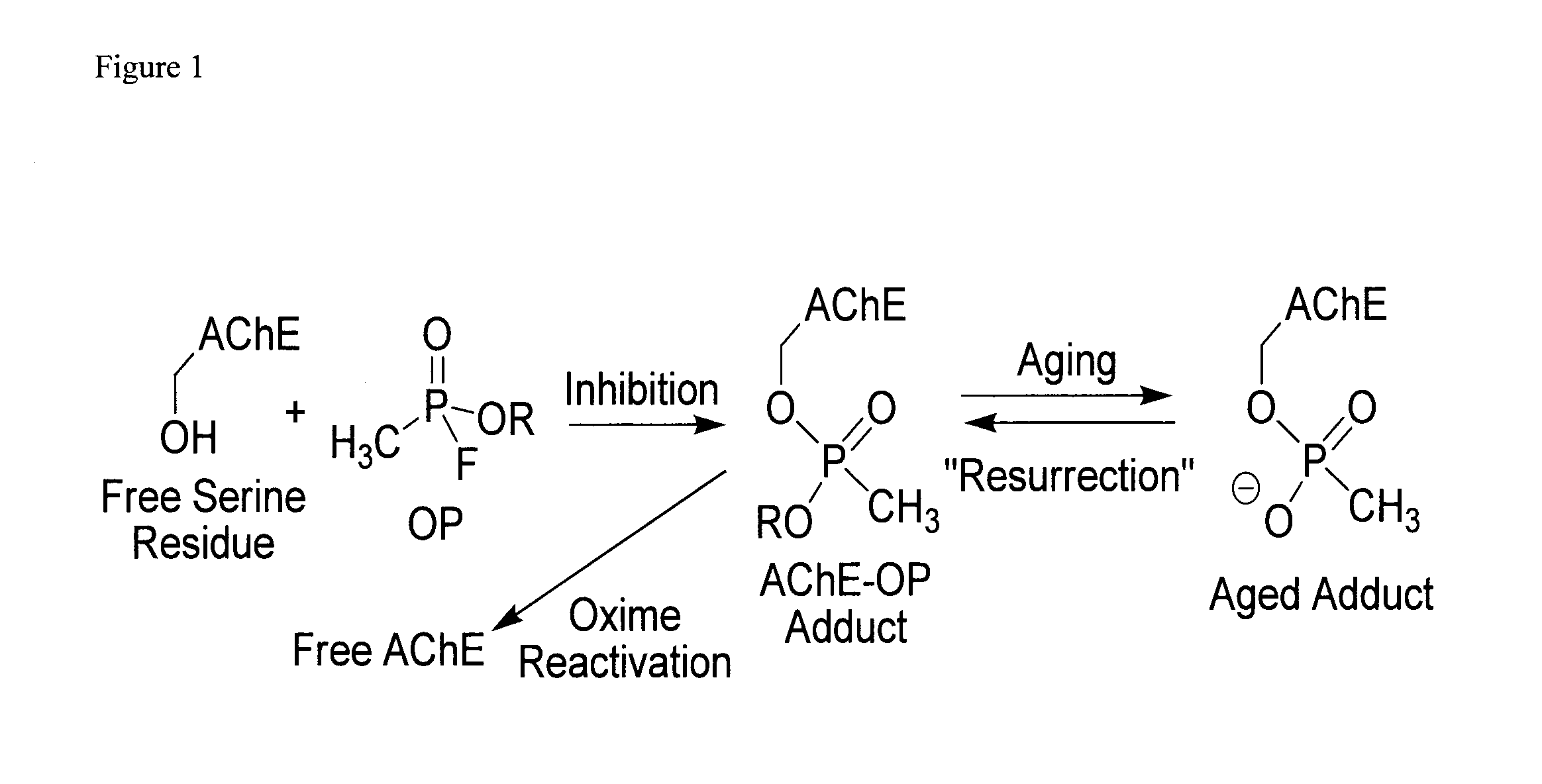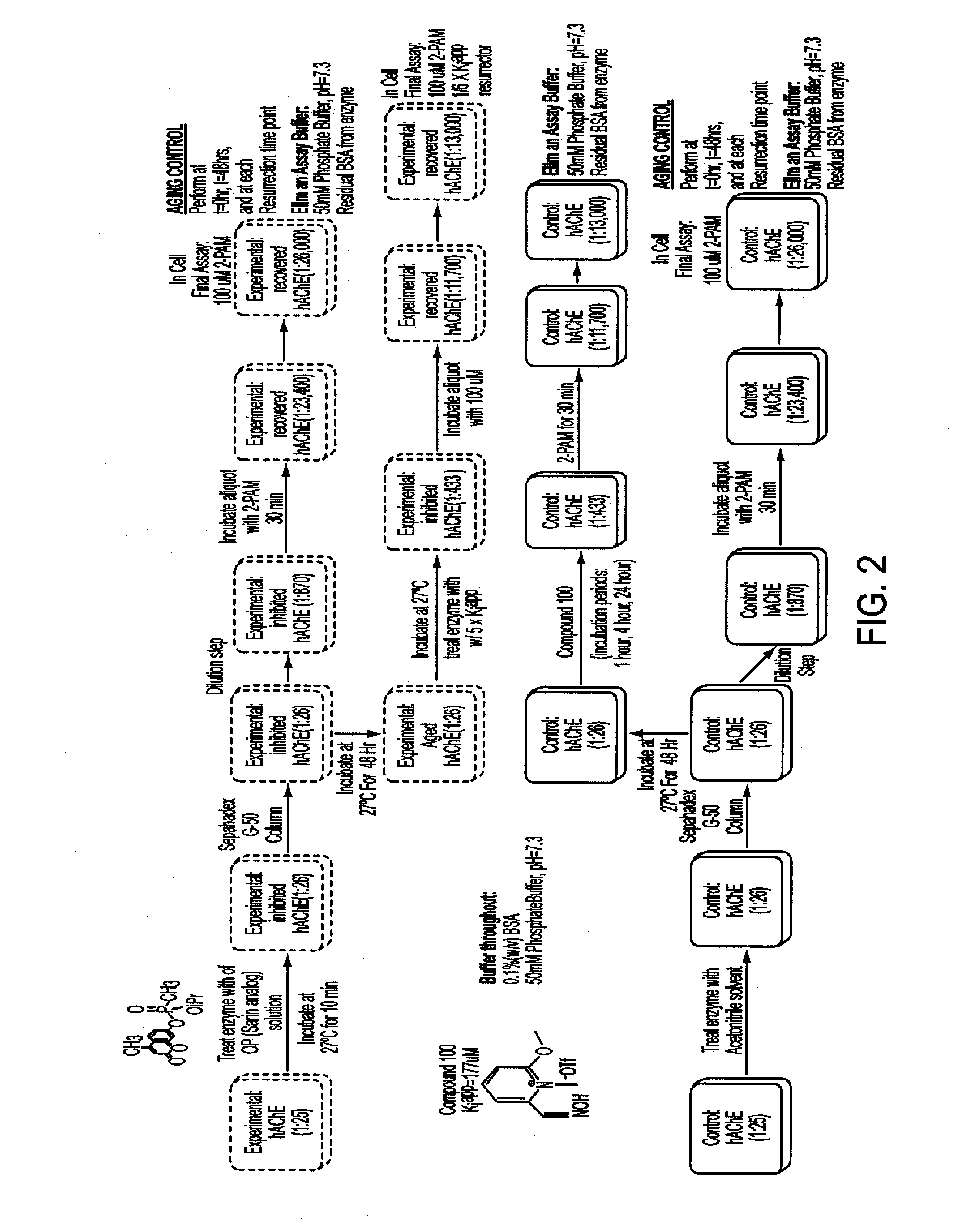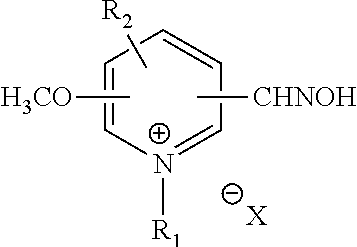Compounds and methods to treat organophosphorus poisoning
a technology of organophosphorus and compound, applied in the field of compound and method to treat organophosphorus poisoning, can solve the problems of over 1 million morbidities and 200,000 deaths annually, phosphonate nerve agents such as sarin, soman, vx, tabun, and sarin, and is considered a serious threat to national security, and overstimulation of muscles
- Summary
- Abstract
- Description
- Claims
- Application Information
AI Technical Summary
Benefits of technology
Problems solved by technology
Method used
Image
Examples
example 1
Synthesis of the Compound (100)
[0046]
[0047]A 3 mL glass vial was equipped with a rubber septum and magnetic stir bar. The vial was brought into a glove box and charged with trimethyloxonium tetrafluoroborate (198 mg, 1.33 mmol). The vial was sealed and removed from the glove box. A separate 3 mL vial was charged with 2-methoxy-6-pyridinecarboxaldehyde (Aldrich #662933, 184 mg, 1.34 mmol) and was dissolved in CH2Cl2 (1.5 mL). The solution of pyridine was added via syringe onto the solid trimethoxonium tetrafluoroborate at room temperature. The vial which contained the pyridine was rinsed with CH2Cl2 (1 mL) and the rinse solution was injected into the reaction vial. The reaction vial was kept at room temperature and stirring was maintained at ca. 400-600 rpm. Over the course of the reaction (17 h), the solid trimethoxonium tetrafluoroborate gradually dissolved, the solution clarified, and an oil gradually formed. At the end of the reaction, hexanes (2 mL) were added after which stirri...
example 2
Synthesis of the Compound (101)
[0049]
[0050]A 3 mL glass vial was equipped with a rubber septum and magnetic stir bar. The vial was brought into a glove box and charged with MeOTf (116 μL, 1.06 mmol) by micropipette. The vial was sealed and removed from the glove box. A separate 3 mL vial was charged with 4-methoxy-2-pyridinecarboxaldehyde (Astatech C10253, 145 mg, 106 mmol) and was dissolved in PhMe (1 mL). The solution of pyridine was added via syringe onto the MeOTf at room temperature. The vial which contained the pyridine was rinsed with PhMe (0.5 mL) and the rinse solution was injected into the reaction vial. The reaction vial was kept at room temperature and stirring was maintained at ca. 400-600 rpm. After 20 h, hexanes (2 mL) were added after which stirring was stopped. Any solid or oil was allowed to settle and the solvent was removed by glass pipette. The solid or oil was then rinsed with several portions of hexanes followed by diethyl ether. Residual solvent was then remo...
example 3
Resurrection of Aged-AChE by Compound 100
[0052]Recombinant human acetylcholinesterase (hAChE) was irreversibly inhibited by exposure to an organophosphonate (OP) analog of Sarin, 7-(isopropyl methylphosphonyl)-4-methylumbelliferone (Timperley, C. M., et al., J. Fluor. Chem., 2006, 127, 1554-1563). The fully inhibited hAChE-OP adduct was separated on a Sephadex G-50 Quick Spin column to remove excess nerve agent, and it was “aged” for 48 hours at 27° C. Uninhibited hAChE was prepared following the same procedure by substituting acetonitrile in place of the OP inhibitor, and it served as the control throughout the resurrection assay procedure. Hydrolysis of acetylthiocholine (ATCh) by hAChE was measured spectrophotometrically following the Ellman et al. assay method (Ellman, G. L., et al., Biochem. Pharmacol., 1961, 7, 88-95) at t=0 and 48 hours. OP inhibited hAChE was assayed after treatment with 2-pralidoxime (2-PAM) to determine the percentage of “aged” hAChE (% AChEaged), or resid...
PUM
 Login to View More
Login to View More Abstract
Description
Claims
Application Information
 Login to View More
Login to View More - R&D
- Intellectual Property
- Life Sciences
- Materials
- Tech Scout
- Unparalleled Data Quality
- Higher Quality Content
- 60% Fewer Hallucinations
Browse by: Latest US Patents, China's latest patents, Technical Efficacy Thesaurus, Application Domain, Technology Topic, Popular Technical Reports.
© 2025 PatSnap. All rights reserved.Legal|Privacy policy|Modern Slavery Act Transparency Statement|Sitemap|About US| Contact US: help@patsnap.com



